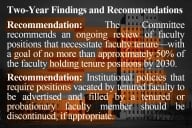You have /5 articles left.
Sign up for a free account or log in.
This article has been updated with reactions.
An administrative law judge in Florida last week upheld new rules by the State Department of Education that require significantly more of state college faculty members – particularly in the areas of student success – for them to earn continuing contracts.
The ruling also upholds a change to the time it takes professors to earn their first contract. Instead of three years, faculty members will now only be eligible after five years of service.
Faculty members fear the changes – coupled with recent legislation eliminating mandatory remediation in math and English at Florida colleges – are an attack on the state’s equivalent of tenure.
“A lot of us have a lot of fears about it,” said a professor of English at one of the state's colleges who did not want to be identified by name or institution for fear of retribution. “This is a possible perfect storm to come, if the retention and completion agenda were to be [tied to] a performance measure – especially in English and math courses, where we can no longer remediate.”
Catherine Leisek, a professor of fine arts at Broward Community College and a member of the Board of Directors of the National Education Association, called the changes “repulsive.”
“The big picture is that they want to get rid of tenure and would love to get rid of continuing contracts,” she said.
The United Faculty of Florida, the faculty union affiliated with both the American Federation of Teachers and the NEA, had challenged the new contract rules as beyond the scope of the department's powers. But the judge rejected that view and said that the board was within its rights. The rules affect faculty members at the state college system, which was formerly a community college system but no longer uses that label as many of the former community colleges have introduced some four-year programs. The system – with 28 colleges, nearly 25,000 faculty members and 879,000 students – is among the largest in the United States.
Colleges and universities nationally have been under increasing pressure to demonstrate their success as institutions in student learning. And there has been a strong push in some K-12 districts to evaluate individual teachers in part based on student learning gains as measured by tests, including in Florida. But the movement is unpopular with educators, who say that such systems tend to punish instructors who – however talented and committed they are – teach poorly prepared or disadvantaged students.
In Florida, according to statistics from its Department of Education, about 37 percent of college students graduate within three years or 150 percent of “catalog” time for their programs. That’s above the national average of about 22 percent.
But Florida’s college professors are now under new pressure, thanks to a recent law making remedial math, reading and English courses optional for students starting in the fall. The state legislature passed the law last year to help boost completion rates; non-credit, remedial courses where students can get “stuck” are widely acknowledged as one of the biggest obstacles to finishing a degree.
Professors, however, say that underprepared students entering their classes just as their performance is to be judged on student success is troubling. And many questions remain about how student success will be measured, and who will measure it.
The rules that have now been approved state that each district president, after consulting with faculty, should develop a system to evaluate faculty members, using "appropriate criteria to measure student success." Those criteria "may include":
- Demonstrated or documented learning gains.
- Course completion rates.
- Graduation and/or certification rates.
- Continued success in subsequent and additional courses or educational pursuits.
- Job placements in the appropriate field.
The criteria would be used not only for awarding new continuing contracts, but also for the equivalent of post-tenure reviews, which are also mandated by the new rules.
Proponents of the changes say they’ll increase accountability among professors, but keep oversight local.
Joe Follick, spokesman for Florida’s Department of Education, which includes the State College System, said the contractual changes were part of a process that started two years ago, at the request of members of the State Board of Education. The process involved feedback from college presidents and statewide workshops.
“The rule provides assurances that colleges have an appropriate evaluation system for continuing contracts, but leaves a significant portion of the development and implementation to the local boards of trustees of the colleges and requires the local boards to consider the views of the faculty," Follick said.
The Florida college English professor said that local control would “blunt” some of the new regulations' more negative consequences for faculty. But she wondered how measuring college student success, which remains elusive, would work at the local level. She also said she hoped her performance as an educator would be judged by fellow disciplinary experts.
W. Steve Lang, a professor of educational measurement and research at the University of South Florida at St. Petersburg and a member of the United Faculty of Florida, said in an email that devising an accountability system for college professors linked to student success wasn’t something that should be taken on by the state, given the documented complexities of crafting such systems at the K-12 level.
“If the state cannot successfully build a Volkswagen, then why propose to build a space shuttle?” Lang said. “Unless validity and reliability can be established without a complex system that is way too expensive, then faculty don't want it to determine their career.”
He continued: “Who is complaining that the current system for college faculty is not working? I don't hear college administrators demanding a new way to rate faculty. This is entirely a naive legislature messing with stuff they don't understand for some political or economic agenda. If a common test of some content (like multiple sections of algebra) are appropriate, then colleges are often already doing testing and analyzing the results. Spending more money on another simplistic statewide test that won't do anything but cause conflict seems silly during a time that colleges have plenty of real needs.”
Leisek said the plan ultimately would hurt students in that it would lead to social promotion and grade inflation.
“I think more teachers will be prone to passing students on,” she said. “Why would you put your job in jeopardy? Ethically it’s not correct, but that’s exactly what’s happened in high school and grade schools.”
The English professor said she was less perhaps concerned about the future of tenure in the state than the future of academic freedom. Stripped of contractual protections and being judged on “performance,” professors – especially those in more rural parts of the state – might feel pressure to teach or not teach certain topics, she said.
Legally, the faculty challenge to the new contract rules said that the state board lacked the authority to make such specific changes in the way continuing contracts are awarded.
But Judge June C. McKinney found that the statutes creating the State Department of Education gave it authority over personnel matters at a broad level. As to whether this extends to requiring that promotion criteria include measures of student success, Judge McKinney wrote that the state board has specific authority "to establish a rule to address program offerings 'with tests and other assessment procedures that measure student achievement.' In order to measure progression, criteria to measure student success would be within the parameters of the specific authority and the challenged rule is the appropriate tool to make sure each student is achieving."









